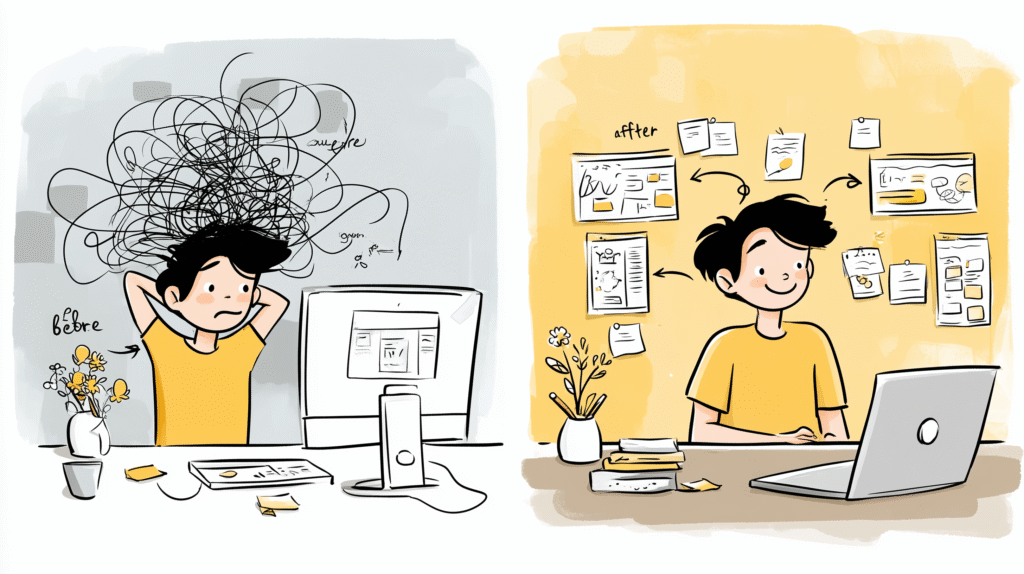Nov. 18th, 2025


One-sentence summary:
Most professionals don’t need more skills—they need a system like the 12-Week Year that can consistently turn their existing skills into measurable results.
Skill acquisition without an execution system creates overload, inconsistency, and shallow application.
The real bottleneck isn’t knowledge—it’s execution bandwidth, which determines how much of what you learn becomes action.
Skills decay quickly without structure, feedback loops, reflection, and scheduled practice.
The 12-Week Year provides the perfect container for skill development by forcing clarity, selectivity, repetition, and measurement.
Concrete examples (marketer, salesperson, analyst) show how skills fail in weak systems and thrive in structured 12-week cycles.
Systems thinking research confirms that skills must live inside reinforcing loops, not isolated bursts of motivation.
Productivity must come first; once the system is in place, skills compound instead of evaporating.
Written by Dan Mintz, a leading productivity strategist, expert in the 12 week year, and the founder of the 12-Week Breakthrough Program. Wharton MBA, MIT Data Scientist, 3x Entrepreneur.
Worked with dozens of people to transform their lives in 12 weeks.
Most professionals believe that the fastest way to advance their career is through acquiring more skills. It feels intuitive: if you just learn another marketing framework, pick up a new AI tool, improve your sales technique, or understand a new analytic method, your outcomes should improve. Skills are tangible. You can point to a course, a certification, or a technical ability and say, “I know this now.”
Productivity, by comparison, has a softer reputation. It is often treated as “being more organized” or “managing your time better.” It rarely feels urgent. And when faced with limited energy, most people prioritize the skill that seems directly tied to their income or performance rather than building a system that supports execution.
But there’s a problem with this logic.
A deep, structural problem that undermines even the most motivated learners.
Most people don’t fail because they lack skills.
They fail because they lack a system that uses the skills they already have.
Skills don’t create results.
Systems do.
After fifteen years of working with the 12-Week Year and refining it into my own enhanced version, the 12-Week Breakthrough, I can say confidently: the order matters. Productivity first, skills second. The system must precede the skill.
What follows is a detailed explanation of why this is true, the psychology and systems science behind it, and how a 12-week execution cycle transforms the way skills develop, stick, and ultimately compound.
Look at the modern professional environment. Access to information is not the problem. Online courses, masterclasses, certifications, cohort-based programs, AI tools, and thousands of free resources have collapsed the barrier to acquiring knowledge.
Yet despite this abundance, most people do not operate anywhere near their potential. They learn, but they don’t consistently apply. They understand, but they don’t integrate. They accumulate skills, but they don’t convert them into sustained performance.
This gap doesn’t exist because people lack talent or intelligence. It exists because they lack execution bandwidth — the structural capacity to take what they’ve learned and turn it into consistent, measurable output.
Execution bandwidth is shaped by clarity, planning, environment, schedule, feedback loops, accountability, and reflection. These are the things we casually call “productivity,” but they aren’t nice-to-haves. They are the foundations of performance.
When execution bandwidth is low, adding more skills doesn’t raise output. It creates overload. Each new skill enters a system that is already saturated, unstructured, and inconsistent. The result is more stress, less progress, and a growing sense of being “behind.”
People don’t need more skills.
They need a stronger system to activate the skills they already have.
Skill development follows a predictable process: exposure, early application, refinement, feedback, repetition, and automation. Research in deliberate practice (Anders Ericsson), deep work (Cal Newport), self-determination theory (Deci & Ryan), habit formation (James Clear), and goal-setting theory (Locke & Latham) all converge on the same truth:
Skills only develop inside a structure.
Without structure, skills decay.
There are several reasons for this.
When a person learns five new things but never decides which one will be the focus for the next month, everything remains conceptual. Without prioritization, nothing becomes a habit.
It is easy to say, “I’m going to start applying this new method.” Without putting it on the calendar — consistently — the competing priorities of daily life swallow the intention.
Human motivation is tightly linked to visible progress. Without measurement or evaluation, the brain interprets the effort as wasted, and the learning fades.
Weekly and cyclical review is where insights deepen. Without reflection, the skill remains fragile and undeveloped.
The brain cannot internalize new techniques under constant task-switching. Without protected focus, skills never reach automaticity — the level at which they generate value.
None of these issues are solved by adding more skills. They are solved by adding structure.
And this is where the 12-Week Year enters the picture as not just helpful, but essential.
The 12-Week Year, created by Brian Moran and Michael Lennington, is not merely a planning tool. It is a full execution framework built on short cycles, focused priorities, measurement, and accountability — the precise ingredients required for skill development.
Annual goals fail because they create psychological distance. Twelve-week cycles, by contrast, compress time. They force decisions. They create focus. They demand clarity. And they introduce a level of urgency that is strong enough to sustain consistent practice.
When a professional applies the 12-Week Year to skill development, several powerful things happen.
You cannot develop ten skills in twelve weeks. You must choose one or two that directly support a meaningful outcome. This eliminates random learning and channels effort.
Skills must be practiced, not admired. When a skill becomes a weekly commitment — embedded into the structure of the plan — it begins to take root.
Each week closes with a review. Each cycle closes with a deeper evaluation. This aligns perfectly with what research calls “deliberate practice,” where feedback drives improvement.
Visible progress reinforces effort. The cycle creates a rhythm. Each round deepens identity, moving you from “someone learning a skill” to “someone who consistently applies skills.”
This is why the 12-Week Year is not an optional add-on to skill development. It is the foundation that makes skill development work.

Consider “Michael,” a composite example drawn from real patterns I’ve seen across hundreds of professionals.
Michael is a mid-career marketer with solid instincts and a desire to grow. He has taken courses in copywriting, analytics, positioning, branding, and more. He reads obsessively. He follows thought leaders. He has more than enough information to operate at a higher level.
yet…
His performance is inconsistent.
His improvements are shallow.
He knows more than he outputs.
When we examine his workflow, the reasons become clear. He learns concepts, but never chooses which one to apply next. Insights remain in notebooks. The calendar is reactive. There is no scheduled deep work. No weekly review. No measurement of what changed after applying a concept. No accountability.
Michael is highly skilled — but in a system that cannot convert skill into output.
When he adopts a 12-Week Year structure, the transformation is dramatic.
He chooses one focus: improving his landing page copy.
He sets a 12-week goal tied to conversions.
He schedules three deep work blocks per week.
He tests variations.
He gathers data.
He reviews weekly.
He adjusts based on real feedback.
He ships consistently.
In twelve weeks, one specific skill goes from theoretical to operational. And because the structure is in place, the next cycle becomes easier. The system compounds.
It is not the skill that changed.
It is the environment around the skill.
This is why productivity comes first.
A salesperson learns a new discovery-call framework. Without structure, the excitement lasts a week. The skill decays because it was never tied to a measurable objective, never practiced deliberately, and never reviewed.
Under the 12-Week Year, the salesperson sets a 12-week target, practices the framework in every call, tracks close rates weekly, and reflects on patterns. The skill embeds.
A data analyst learns a new visualization technique. Without structure, it becomes another tool they “know” but rarely use.
Under the 12-Week Year, the skill is tied to a single high-impact dashboard to be delivered within the cycle. The analyst schedules focused work, iterates weekly, gathers stakeholder feedback, and refines. The technique becomes part of their operating system.
In “Thinking in Systems,” by Donella Meadows demonstrates that systems produce behavior — not intentions. A reinforcing loop strengthens with repetition, feedback, and clarity. Skill development is exactly this kind of loop.
A skill cannot survive outside a system because:
behavior defaults to the path of least resistance
without feedback, loops break
without time, loops stall
without clarity, loops diffuse
without accountability, loops collapse
The 12-Week Year creates a reinforcing loop for skill development: choose → practice → measure → refine → repeat. This loop is why the framework is so effective at embedding new behaviors.
Productivity is not an accessory. It is the system that holds the loop together.
After working with the 12-Week Year for over fifteen years, I began integrating modern research from deep work, deliberate practice, behavioral psychology, and system thinking to enhance its structure. The result is the 12-Week Breakthrough — a more advanced evolution built specifically for today’s environment of distraction, rapid skill decay, and AI-driven change.
But the foundation is still the 12-Week Year.
It is — and remains — the core productivity framework.
My enhanced version simply builds on that foundation, adding layers that strengthen focus, deepen consistency, and accelerate mastery. But the system behind the system is unchanged: execution cycles, clarity, commitment, review, and accountability.
Most people follow the wrong order:
learn skills
hope they stick
wonder why nothing changes
The correct order is:
build the system
choose the skills
apply them consistently
measure and refine
let them compound
Without a productivity system — specifically, a short-cycle execution framework like the 12-Week Year — skills remain dormant potential.
With a system, skills become performance.
If you are feeling behind, overwhelmed, or frustrated with how little progress you’re seeing relative to what you know, the next step is not another course, tool, or technique.
It is building the structure that makes skills matter.
Productivity before skills is not a slogan.
It is a principle of human performance.
Once you adopt it, your progress becomes inevitable.
Because learning without structure leads to fragile skills that never reach consistent application. Skills require repetition, measurement, and deliberate practice. A productivity system—especially the 12-Week Year—creates the environment that makes skill acquisition stick. Without that foundation, most skills remain theoretical and quickly decay.
The 12-Week Year compresses time and forces decisive choices. Instead of dabbling in multiple skills, you select one or two to develop deeply over 12 weeks. This time compression increases urgency, strengthens focus, and accelerates practice. Weekly plans, deep work blocks, and scorekeeping ensure the skill moves from knowledge → application → refinement → mastery.
No. True productivity is an execution architecture that governs clarity, planning, focus, accountability, and measurement. Time management is only one piece. Systems thinking (Davenport), deliberate practice (Ericsson), and deep work (Newport) all show that behavior is shaped by structure. Productivity is the system; skills are the content.
Technically yes—but it’s almost always a mistake. Skill acquisition requires concentrated focus. Spreading your attention across multiple skills dilutes depth and slows progress. The 12-Week Year encourages selectivity so you can achieve real mastery instead of superficial familiarity.
That’s a sign of low execution bandwidth, not low capability. When you have strong skills but inconsistent results, the missing piece is usually structure: weekly planning, prioritization, deep work scheduling, and regular review. Strengthening the system dramatically increases the return on the skills you already have.
The 12-Week Breakthrough is my enhanced evolution of the 12-Week Year—built after fifteen years of applying and refining the framework. It integrates modern research from deep work, deliberate practice, behavioral psychology, and system thinking. But the core structure remains the 12-Week Year. The Breakthrough simply supercharges it for today’s work environment.
Most people experience dramatic improvements within a single 12-week cycle: clearer priorities, deeper focus, more finished work, and sustained skill growth. Over multiple cycles, the compounding effect becomes visible—skills integrate faster, performance becomes more stable, and you operate with greater clarity and confidence.
Usually two to three 12-week cycles. The first cycle builds awareness and rhythm. The second cycle improves precision and consistency. By the third cycle, the system becomes part of your identity—you naturally plan, execute, measure, and adjust.
No. The 12-Week Year is a self-contained framework that can be implemented with basic tools: a calendar, a notebook, and a weekly planning ritual. The principles are simple but powerful: short cycles, focused goals, structured planning, scorekeeping, and accountability.
Start with one question: “What skill, if improved over the next 12 weeks, would have the highest leverage on my work or business?” Choose one skill. Build a 12-week goal around it. Create a weekly plan. Schedule deep work. Track progress. You don’t need to perfect the system immediately—just start using it. Clarity increases through action.

Dan Mintz is the creator of the 12 Week Breakthrough Program. He advised dozens of individuals on how to achieve their most ambitious goals and reach their full potential.
Dan can be reached at:
dan.mintz@12week-breakthrough.com
About Dan Mintz
Additional Links:
Join the Program
Our Blog Page
https://12week-breakthrough.com/12-week-system-vs-productivity-hacks/
12 Week Year Implementation Guide 2026
Getting Things Done vs the 12 Week Year
Ahcieve Your Most Ambitious Goals with the 12-Week Year
Why 12 Weeks vs 12 Months?